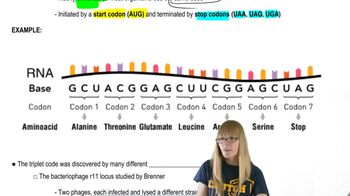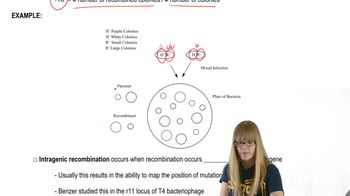Several lines of experimental evidence pointed to a triplet genetic code. Identify three pieces of information that supported the triplet hypothesis of genetic code structure.
Describe the gene and protein defects in phenylketonuria (PKU). How are these defects connected to disease symptoms?
 Verified step by step guidance
Verified step by step guidance
Verified video answer for a similar problem:
Key Concepts
Phenylalanine Hydroxylase (PAH)

Autosomal Recessive Inheritance

Dietary Management

The human mitochondrial genome encodes only 22 tRNAs, but at least 32 tRNAs are needed for cytoplasmic translation. How are all codons in mitochondrial transcripts accommodated by only 22 tRNAs? The Plasmodium mitochondrial genome does not encode any tRNAs; how are genes of the Plasmodium mitochondrial genome translated?
Outline the events that occur during initiation of translation in E. coli.
A portion of a DNA template strand has the base sequence 5′-...ACGCGATGCGTGATGTATAGAGCT...-3′
Identify the sequence and polarity of the mRNA transcribed from this fragmentary template-strand sequence.
A portion of a DNA template strand has the base sequence 5′-...ACGCGATGCGTGATGTATAGAGCT...-3′
Which is the third amino acid added to the polypeptide chain?
A portion of a DNA template strand has the base sequence 5′-...ACGCGATGCGTGATGTATAGAGCT...-3′
Assume the mRNA is written in the correct reading frame. Determine the amino acid sequence encoded by this fragment. Identify the N- and C-terminal directions of the polypeptide.
